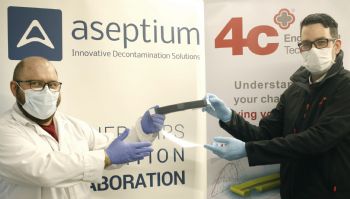
Inverness-based 4c Engineering has joined forces with its neighbour Aseptium to meet the urgent local need for personal protection equipment (PPE).
The two companies, both based on Highlands and Islands Enterprise’s Inverness Campus, contacted Raigmore Hospital to see if their combined design and rapid manufacturing capabilities could be used in the fight against coronavirus.
Their offer to produce face shields was take up by the ICU team at Raigmore, kicking off Project Corran.
Working to a clear brief, the two companies designed the simplest method of providing face protection that would be robust, secure, comfortable and could be rapidly manufactured in volume.
Pawel de Sternberg Stojalowski of Aseptium, said: “This project is a testimony to what a collective of engineers can achieve when they face a challenge together. It’s all about community and collaboration.”
Stewart Nicol, Inverness Chamber of Commerce chief executive, said: “I congratulate Chamber members 4c Engineering and their partners on an outstanding and remarkable achievement.
“It has been great to work with them to help source materials and local suppliers.
“The delivery of a substantial quantity of this vital equipment to help NHS Highland deal with the challenge of COVID-19 in such a short timescale is outstanding.
“To make their design ‘open source’ is a credit to everyone at 4c Engineering and it is fantastic to see innovative Highland businesses leading the way.”
After sourcing materials and refining the design throughout the week, a meeting was held on Friday afternoon (27 March) where the first prototype was approved by Raigmore ICU and Infection Control staff.
Dr Jonathan Whiteside, Clinical Lead, Department of Critical Care at Raigmore Hospital, said: “While we are generally happy with the NHS supply chain, at times of great demand, such as we are seeing with the CoViD-19 pandemic, there can be interruptions or shortages.“
“We were delighted to be approached by 4c Engineering, who were able to source materials locally, and produce much needed protective visors.
“These have been put to immediate clinical use in our Intensive Care Unit, providing staff with the necessary protection and allowing them to continue to provide high quality care, during these difficult times.
“Our whole team are extremely grateful and are proud to be supported by local businesses working together, and helping us care for our patients in NHS Highland.”
Under the organised leadership of 4c’s Jenny Allen, the Project Corran team worked right through the weekend in shifts of staff and volunteers, and the first 200 face shields were delivered to Raigmore on Monday afternoon.
The Corran design is simple, and unlike alternatives does not require 3D printing – it is made of four commonly available components.
The design is being made freely available and can be found on this link
bit.ly/33YS9Ju with full manufacture guidance.
The only requests are that design credit is given, modified designs have an equally open license and that manufacture is non-profit.
Peter MacDonald, 4c Engineering director, said: “Although national procurement of PPE has been progressing at pace, we were able to ensure that the ICU in Raigmore, our local hospital, was well provided with the first 1,000 Corran face shields and as we have made it open-source we hope that the lessons we’ve learned can be applied by makers across the country and beyond.”